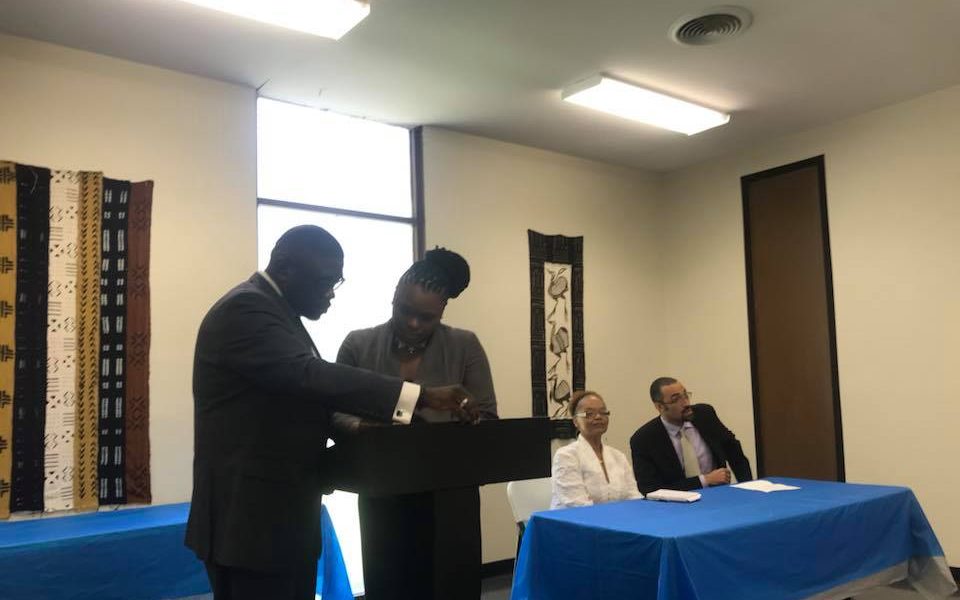The Office of Civil Rights at the US Department of Education has agreed to open an investigation into a complaint on behalf of students at Ashley Elementary that alleges Winston-Salem/Forsyth County Schools intentionally discriminated against black and Hispanic students in its response to concerns about mold at the school. The complaint was brought by the Youth Justice Project at the Southern Coalition for Justice on behalf of the Action4Ashley Coalition in August. The coalition, since renamed Action4Equity, includes seven organizations, including the Winston-Salem NAACP and the Ministers Conference of Winston-Salem & Vicinity.
The Office of Civil Rights enforces Title VI of the 1964 Civil Rights Act, which prohibits discrimination on the basis of race, color, or national origin in any program receiving assistance from the US Department of Education.
The Dec. 20 letter from Letisha Morgan, a team leader for the Office of Civil Rights, acknowledges that the agency has jurisdiction in the matter. Morgan cautioned “that opening the complaint for investigation in no way implies that OCR has made a determination on the merits,” adding that the agency will ask as “a neutral fact-finder, collecting and analyzing relevant evidence” from the complainant, the school district, and other sources.
While the investigation is underway, Morgan indicated that Action4Equity and the school district can take advantage of a voluntary program known as Facilitated Resolution Between the Parties, similar to mediation, to try to reach a settlement out of court.
The complaint asks the Department of Education to order the district to:
- “Take all necessary steps to build a new facility for Ashley as soon as practicable”;
- Provide students and staff who are experiencing or are at risk of symptoms connected with poor air quality with the opportunity to transfer to other schools in the meantime;
- Provide compensatory education services to students who missed school due to health problems associated with air quality during the 2017-2018 school year; and
- Survey facility conditions across the district to determine whether similar problems exist at other schools, particularly those that serve predominantly non-white and low-income students.
Brent Campbell, the chief marketing and communications officer for the district, said the district received notice of the investigation last week. “We’ll cooperate with them fully,” he said, “as we move forward.”
The district spent $1.5 million on renovations, including new HVAC units and a roofing, over the summer before Ashley reopened for the fall semester. The district reported in a Dec. 21 update on its website that recent testing by a certified indoor environmentalist on humidity, temperature range, air circulation, building infrastructure and maintenance, and HVAC unit inspections at Ashley yielded “favorable” results.
Campbell said he believes the district has been responsive to community concerns while also contending that the air in the school was never unsafe to breathe. “We worked hard this summer to address the community air quality concerns, and I feel like we have done that,” he said. “If there were complaints, there was no science that ever showed there was a problem. The science showed there were signs of mold, and yes, you should replace it. It did not say the air was unsafe to breathe. We did everything recommended.”
According to data on file with the state Department of Public Instruction, 57.6 percent of pupils enrolled at Ashley Elementary in the 2018-2019 school year are black, and 39.2 percent are Hispanic. The school’s state report card for 2016-2017, the most recent year available, described 84.2 percent of students at the school as “economically disadvantaged.” The school received an F for both end-of-grade math scores and end-of-grade reading scores.
The complaint alleges: “For years, teachers, staff, and students at Ashley have experienced illness and symptoms they associate with mold exposure and indoor air quality problems. According to staff, the Ashley school building, which was built in the 1960s, has persistent moisture issues leading to mold growth and poor indoor air quality throughout the building. These facility conditions have led to health issues for students and staff, including chronic sinus infections, headaches/migraines, itchy eyes, upper respiratory issues, and aggravation of existing allergies.”
The complaint cites a 2014 guidance paper from the Office of Civil Rights at the Department of Education finding, “Older buildings with inadequate or poorly maintained heating, ventilation, and air condition systems still are more likely to house schools attended mostly by students of color, who in many instances are also low-income students.”
Join the First Amendment Society, a membership that goes directly to funding TCB‘s newsroom.
We believe that reporting can save the world.
The TCB First Amendment Society recognizes the vital role of a free, unfettered press with a bundling of local experiences designed to build community, and unique engagements with our newsroom that will help you understand, and shape, local journalism’s critical role in uplifting the people in our cities.
All revenue goes directly into the newsroom as reporters’ salaries and freelance commissions.


Leave a Reply